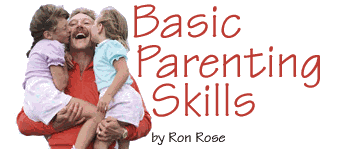

MORE ARTICLES
|
|
Regardless of background, training, upbringing, or physical condition, parenting requires basic skills. These foundational skills, along with a parentís flexibility in the hands of God, will help parents lead their families responsibly. While skill training should be pursued, remember prayer must be central to the development and implementation of these skills. This prayer focus should emphasize parents allowing God to mix and blend these skills into their lives. After all, He is still in the "transforming" business. Prayer should also be focused on the children to respond favorably to the use of these skills.
COMFORTING
Parents must be able to understand and share the pain when their children hurt. Then they must be able to help the child deal with the pain. A comforting parent will often say something like, "That's got to hurt really bad!" The initial step is not fixing, or denying, or condemning, or even teaching; the first step is always to identify with the pain.STORYTELLING
Telling the story of your life is central to parenthood. Children need to hear what happened before they were around. The stories of difficulties, embarrassments, challenges, adventures, friendships, teachers, and fun times will help children build a parent-child bond that will serve them well for a lifetime. Without self-disclosing stories there is little possibility of closeness or depth in the parent-child relationship.GUIDING
All children need instruction. They need to be trained, shown how, and taught what's appropriate. And parents are the teachers. They are teaching-guides who have been there before—they have first-hand experience, so they teach what they know. Parenting-guides teach about life and how to live it the way God intended. The most difficult, but rewarding task of a parent-guide is the inevitable turning loose time when they release the next generation to be skilled teaching-guides for the next generation.
PROBLEM SOLVING
Skills need to be illustrated and demonstrated and practiced.
Children learn how to manage conflict by watching parents handle disagreements and solve problems. Parents model this skill as they settle their differences with spouses, friends, and relatives, and as they work through problems and crisis times. That's one reason why abusive and addicted and abandoning parents are so harmful to their own children.LISTENING
Listening involves the eyes and the ears. Eye contact signals the ears are tuned in. Really good listeners are difficult to find. This skill requires time, focused attention, meandering conversations, and the ability to hear the feelings behind the words. Most good listeners have learned how to listen while doing things together-like cooking, camping, playing catch, driving to appointments, etc.INVOLVEMENT
Playtime is more important than most parents realize. Doing things together requires the investment of time and time is one of the most abused adult resources. Involvement can mean lots of things, from tickling to teeter-tottering to traveling. But, in whatever form it takes, it's a skill investment that pays great dividends.BLESSING
Hugs and hi-fives and the words, "I love you," are all forms of blessing. At the surface level, blessing is any expression of love and appreciation for the child. At a deeper level, blessing is acceptance and hope for the future, even in the midst of failure and disappointment. Truth is, many parents have not received the deeper level of blessing themselves, thus it's hard to know how to give what they don't have.CONFRONTING
This is a vanishing skill today's world. Confrontation is never fun, but it is a necessary part of being a responsible parent. Being confronted helps children face reality, whether painful or not. It forces children to experience the consequences of their behavior. Parents who confront their children help them feel secure enough to work through the problems. Confrontation begins with, "Help me understand what's happening here."FORGIVING
People who live in the same home are bound to hurt and disappoint one another on occasion. These hurts, if not resolved, will grow into resentments that will destroy mutual respect. Learning to ask for and grant forgiveness is one of the most important life skills a child can acquire. For parents, it starts by being open enough to ask for their forgiveness when we have messed up.LIMITING
For some, setting limits is the hardest part of parenting. Healthy parents know that limits are necessary for a growing sense of security and for strong character to develop. Making the rules, keeping the rules, and enforcing the rules is interwoven into all aspects of parenting. Living within limits is a mark of adulthood and it's part of the legacy we pass on to our children. Of course, failing to live within the limits is also passed on. These words set the stage, "It doesn't matter what other people do, this is the way we do it in our family."
HOME
MORE ARTICLES
HEARTLIGHT(R) Magazine is a ministry of loving Christians and the Westover Hills church of Christ.
Edited by Phil Ware and Paul Lee.
Copyright © 1996-98, Heartlight, Inc., 8332 Mesa Drive, Austin, TX 78759.
Article copyright © 1998, Ron Rose. Used by permission.
HEARTLIGHT and the flared heart design are service marks of Heartlight, Inc.
